A reader by the name of theredpikmin sent in a question about the Like Like description in Super Smash Bros. Melee. Like Likes are the shield-eating enemies that have been in the Zelda series since the very first Zelda game.
Anyway, the question is:
I was toying around in Smash Bros Melee and noticed that the “Like-Like” trophy (enemy from the Legend of Zelda series) has a bit of interesting information. In the description, it states that:
Supposedly, their name comes from an old, almost indecipherable Hyrulian proverb: Shield-eaters and world leaders have many likes alike.・
Hmm..I dont recall any Zelda game that Ive played ever stating this. Also, the Zelda Wiki states that this information is non-canon. (link here)
This makes me question if this proverb was in the original Japanese description, or if it was added during translation. Maybe it was a phrased used in the Japanese versions of Zelda games, which was lost in translation somewhere down the line? No clue.
theredpikmin also kindly provided screenshots from the English and Japanese versions of the game:
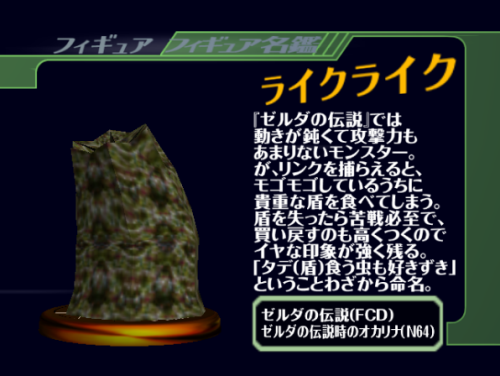 | 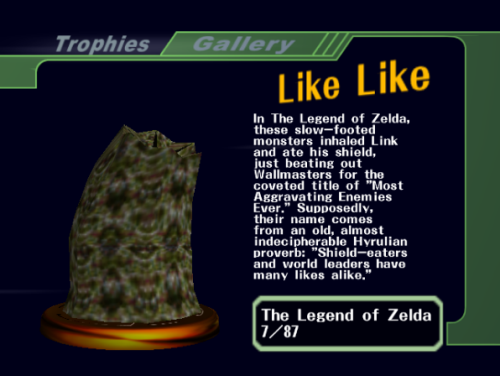 |
| Dairanto Smash Brothers DX (GameCube) | Super Smash Bros. Melee (GameCube) |
So the question is, was this a proverb/saying in the original Japanese text too? Let’s take a look at the text side-by-side:
| Japanese Version (basic translation) | English Version |
| Like Like | Like Like |
| A slow-moving monster in “Legend of Zelda” that barely has any attack power. However, if it catches Link, it’ll eat his precious shield while it’s munching away. | In The Legend of Zelda, these slow-footed monsters inhaled Link and ate his shield, just beating out Wallmasters for the coveted title of “Most Aggravating Enemies Ever.” |
| Not having a shield is a recipe for disaster, and buying another one costs a lot, so this enemy leaves a very unpleasant impression. | |
| Its name comes from the proverb, “Even bugs that eat water pepper have their personal like-likes.” | Supposedly, their name comes from an old, almost indecipherable Hyrulian proverb: “Shield-eaters and world leaders have many likes alike.” |
Wow, there’s a lot of cool stuff here. First, the simple things:
- In Japanese, they’re called “Like Like” too, just as it’s pronounced in English. For extra clarification (you can never be too sure!) the “like” is pronounced like the “like” in “I like you.”
- The English version of the text in this game isn’t always a straight translation of the original text. I used to play this game so much, I can’t believe I forgot that!
In the Japanese text, the proverb mentioned is a genuine, real-life Japanese proverb: 蓼食う虫も好き好き (tade kū mushi mo sukizuki).
 |
In basic terms, this is saying that bugs that eat “tade” have their own “like-likes” or personal preferences. A “tade” is an extremely bitter plant known as a “water pepper” in English. So, basically, the proverb is saying that different people can have wildly different preferences.
How does this fit in with Zelda, though? It’s just some simple word-play; the word “tade” was replaced with “tate”, which means shield, so now you got things that “like-like” to eat shields! True to Nintendo’s old roots, its early games had lots of references to traditional Japanese stories and phrases – Lakitu/Jugem in Super Mario Bros. and the Tanooki suit are some really quick examples. So this Like Like thing in Zelda is probably another instance of that.
 |  |
Since this proverb isn’t known outside of Japan and since it doesn’t work well in English, the localizers’ solution was to change the proverb’s content and say that it’s actually an old Hyrulian saying. It’s a pretty cool localization choice – the easy/lazy way out would’ve been to just omit the proverb and the origin of the name altogether, especially since the localizers had already changed other parts of the description. But they didn’t, which probably delighted lots of English-speaking Zelda fans!
theredpikmin’s next, unstated question is: is this English proverb thing canon?
Canon, localizations, and fandoms are a recipe for craziness so I won’t even try to tackle this issue, but I’d like to hear what you think. Let me know in the comments.
If you like this sort of analysis of Japanese Zelda stuff, check out my book about the localization differences between the Japanese and English versions of Zelda 1. It even looks at all the little translation changes Nintendo made over time!


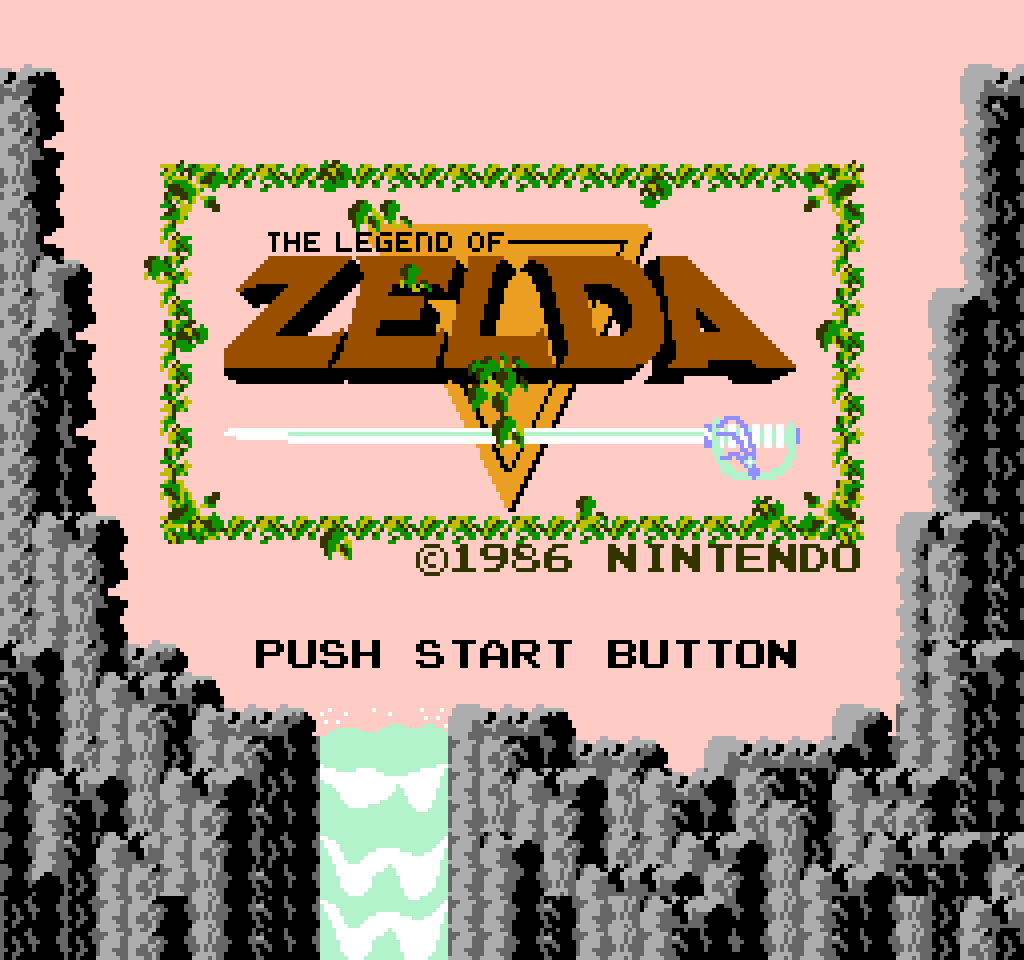
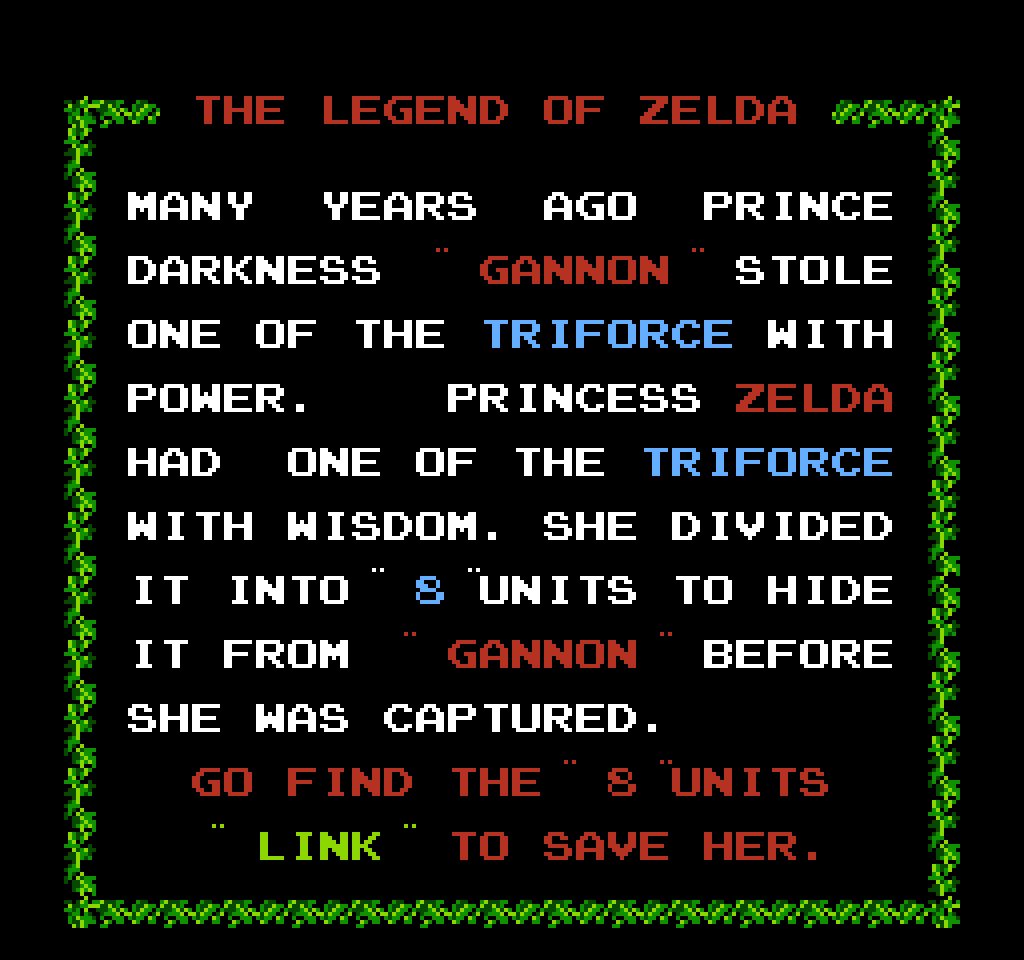
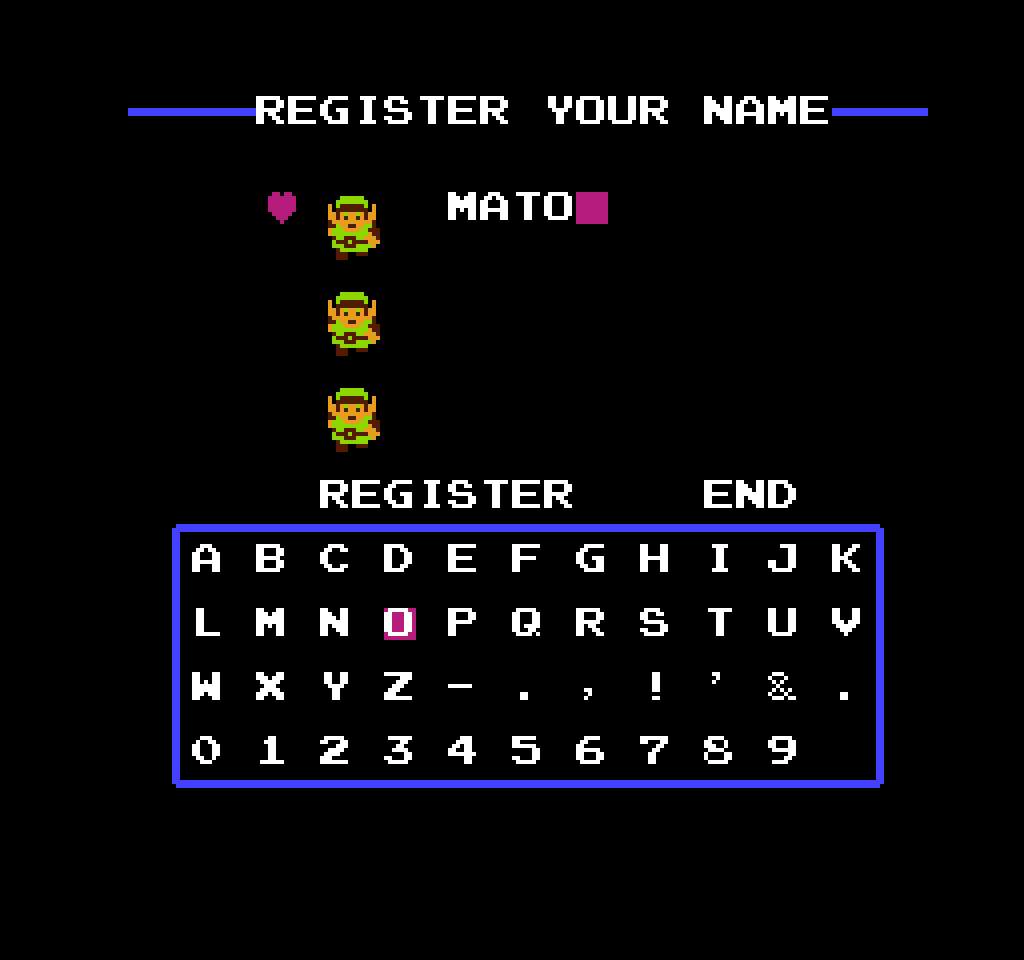

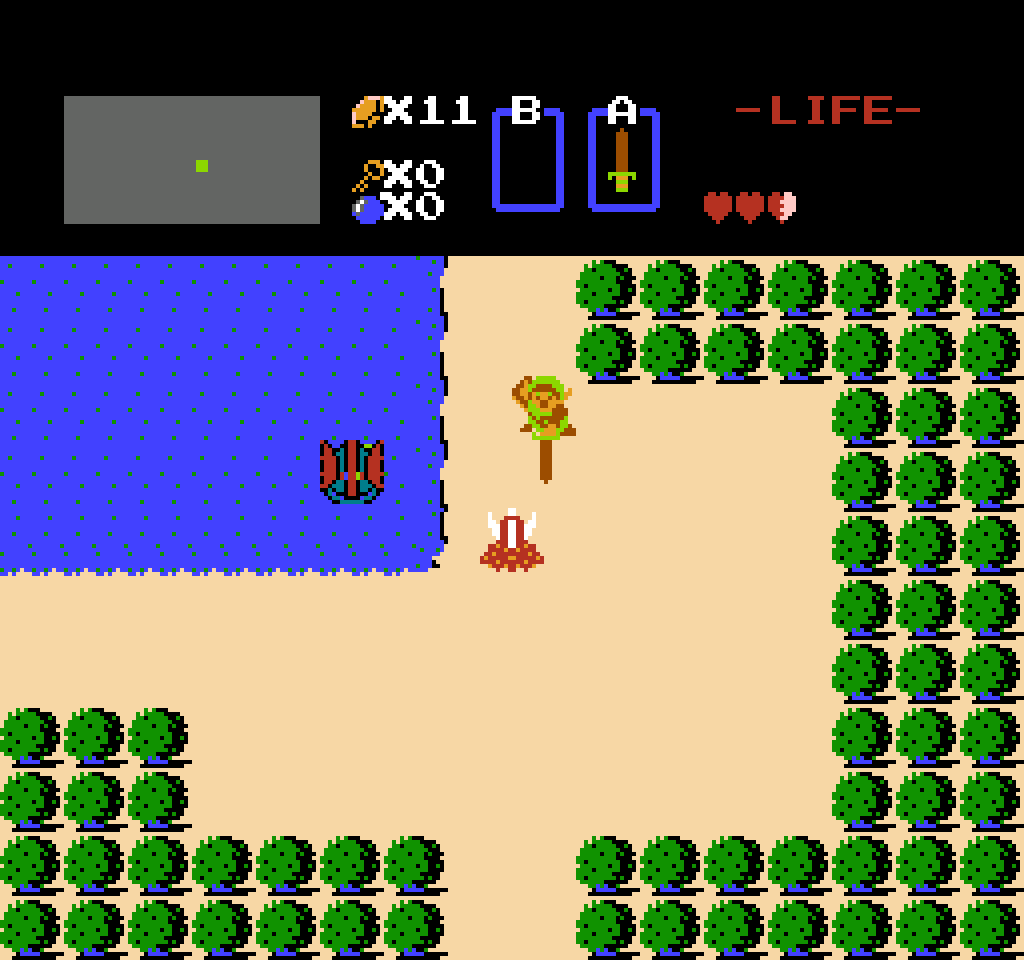
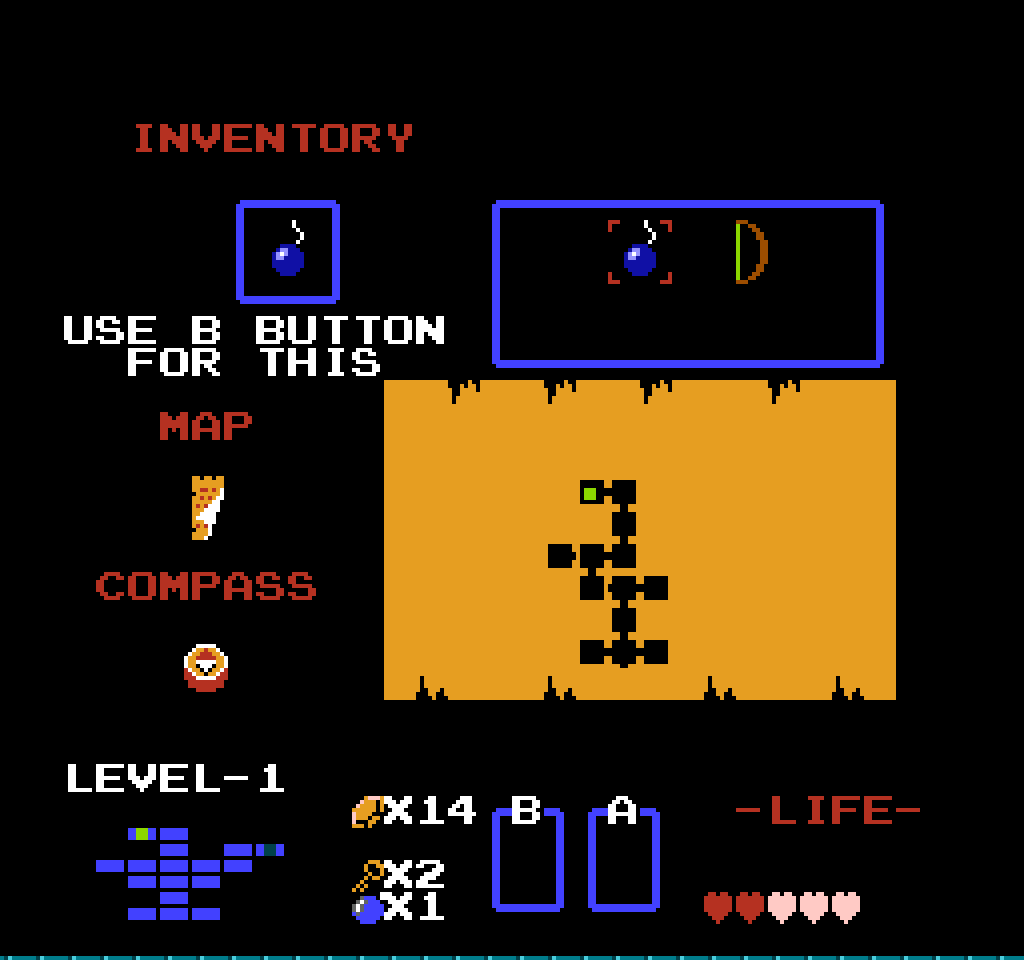
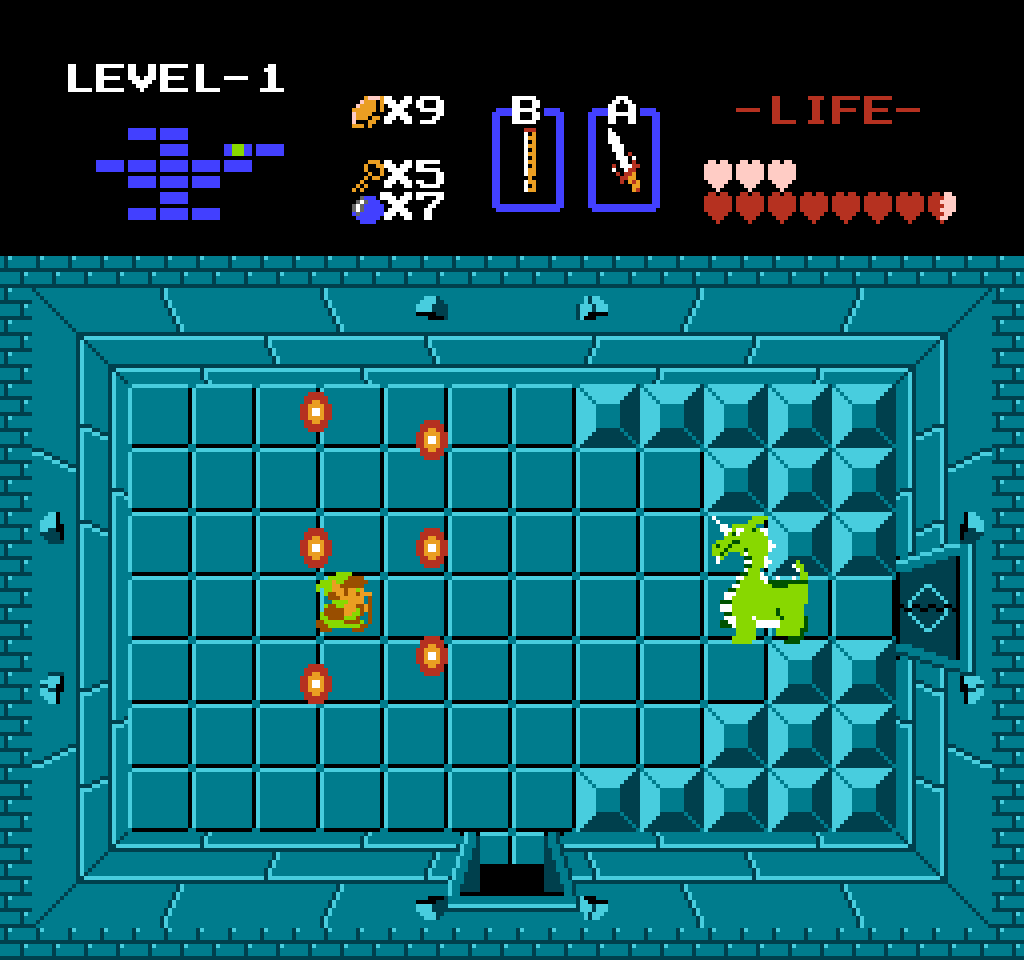
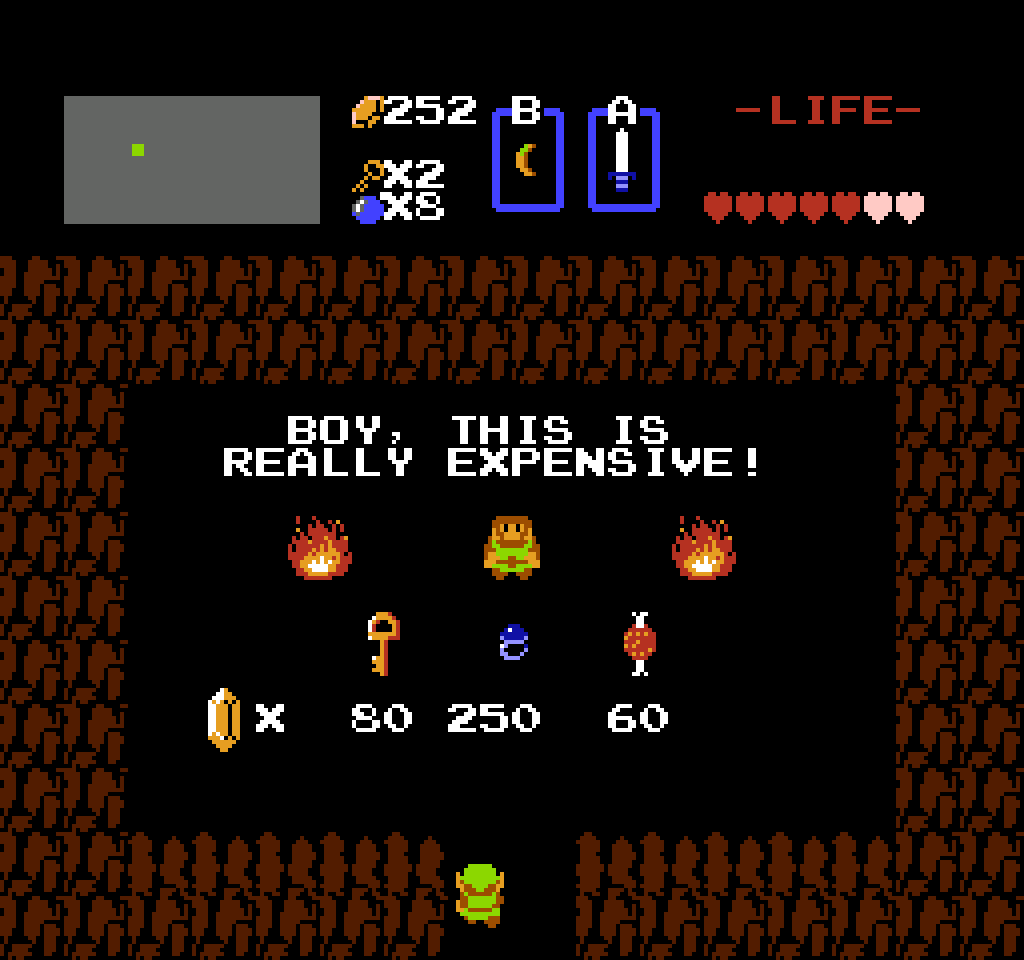
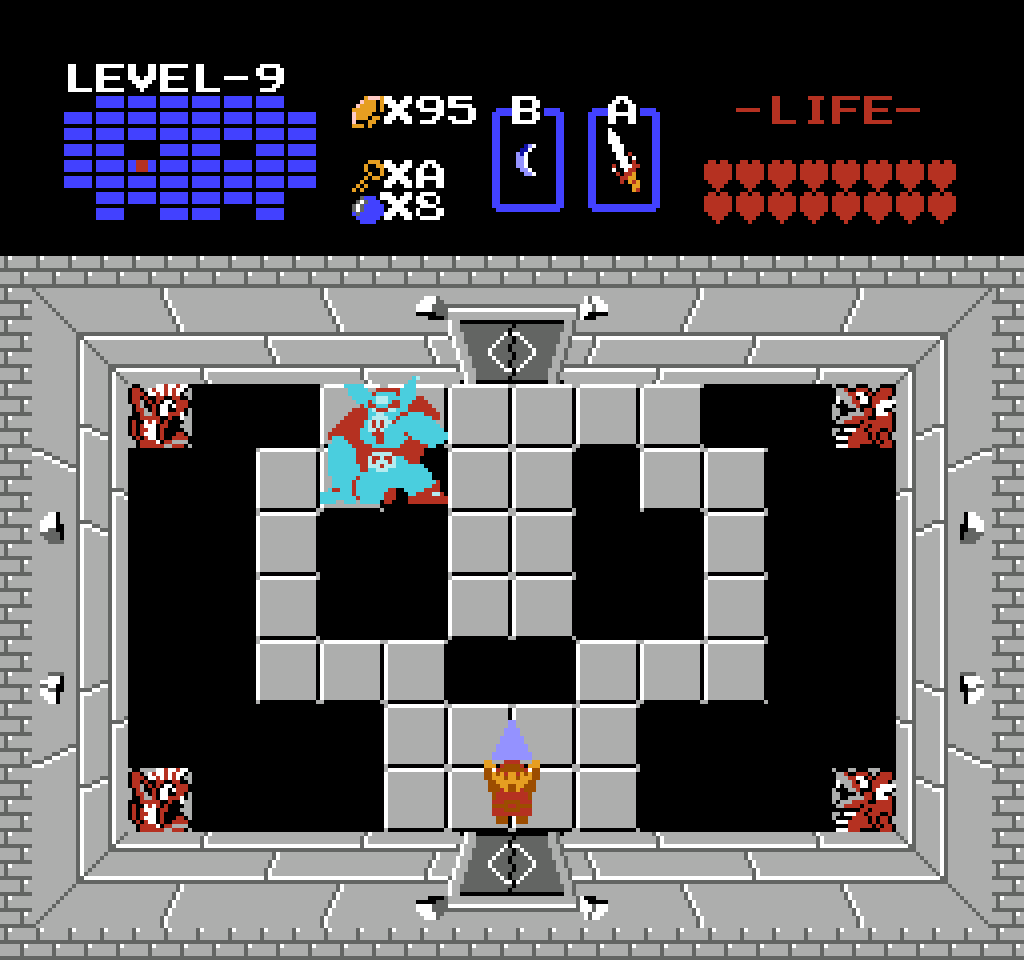
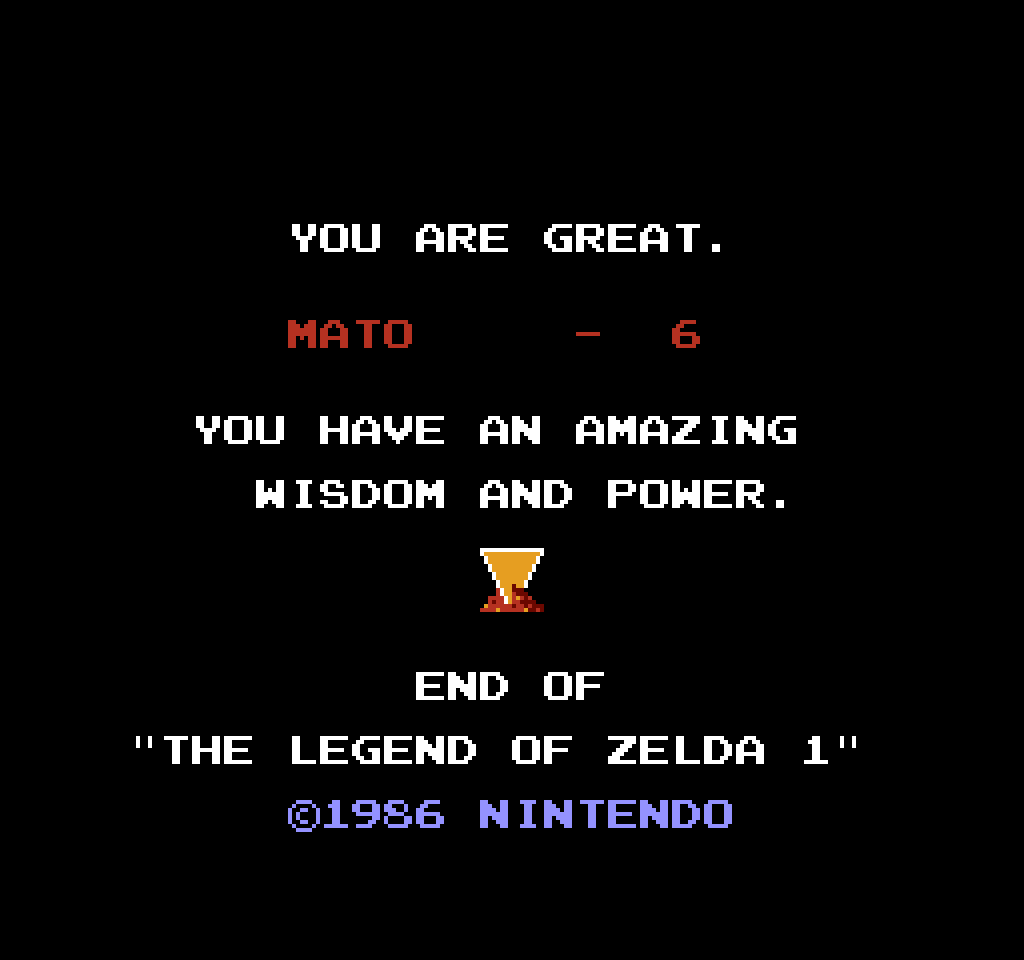
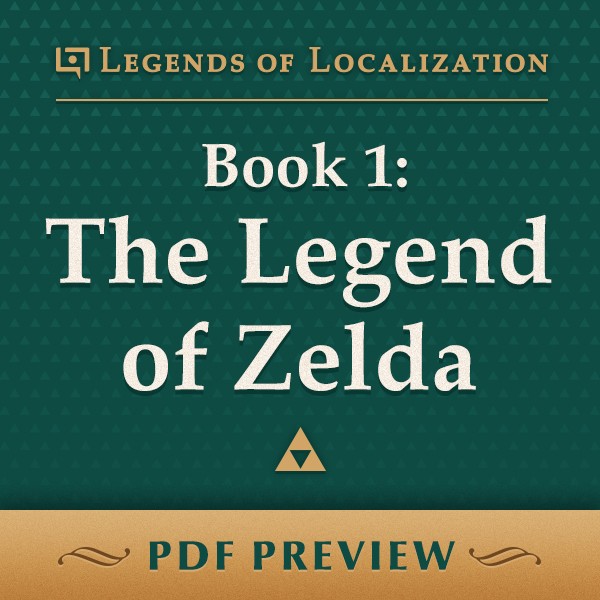
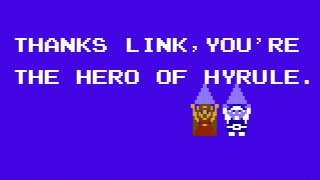
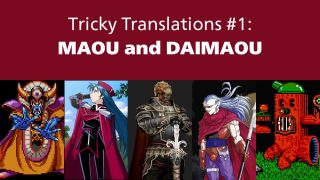
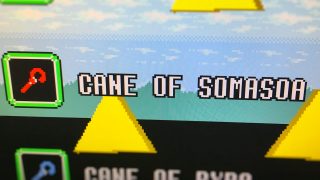
Canon or no, I have to say that I (still) like the English version’s Hylian proverb, heh. That’s stuck with me for years, and probably will stick with me for years to come.
And, well, just to share my own opinion, Like-Likes in Zelda 64 did, do, and will probably forever creep me out to no end. I’m no artist or game designer so I don’t suppose it means much that I’m just fine with their design, but just to say, their appearance coupled with that freaky sound they make…that’s a combination that will forever haunt my nightmares. It does indeed out rank the Wallmaster in terms of being an aggravating enemy, heh. At least in my opinion.
Anyway, it is certainly interesting to at last know the true origins of this creature’s name! Mystery solved.
Though what still confuses me is…well. “Like-like water pepper”? Why would a proverb be worded like that? Why is that word repeated? From a grammar standpoint at least, it baffles me. Why is it necessary to have it as “like-like” instead of just “like”? Perhaps I’m just missing something totally obvious, heh, but I can’t help wondering anyway. (…Or I’m COMPLETELY misunderstanding you, the original proverb is written as just “like”, and the game was changing it to “like-like” to make the connection more obvious. But it doesn’t seem to me that this is the case, anyway…)
Yeah, the “like like” thing in the phrase is actually a bit more nuanced than what I covered since I wanted to keep it simple. In a maybe-too-literal sense it does mean “like like” but actual meaning-wise it’s a phrase of its own that’s closer to “a matter of taste/preference”.
Ooh, okay, fair enough then. Just wondered! Much appreciation for clearing that up. ^_^
Too bad this was lost in the French version. They’re called “pudding” in French, and the trophy description states that “Nobody knows where their weird name comes from, but it’s probably inspired by their gelatinous appearance”. The first part of the description is almost the same as in English, but the Wallmaster reference was left out.
Neat, I wonder if maybe it was translated from the original Japanese in that case, and the French localizers had to deal with the proverb in their own way.
The first part of the French description says:
“In the Legend of Zelda, these slow creatures inhale Link and spit him out without his precious shield, earning the very coveted title of most annoying ennemy in the game.”
So it looks like it was translated from English rather than from Japanese.
Yeah, it’s pretty much the same in German. The difference is that Like Like’s German name is “Raubschleim” which translates to something like “robbery slime” and the text basically says that the name is self-explanatory and that Like Like’s just steal shields for no real reason as they “can’t really use them”. Guess they didn’t really know how to come up with proverbs because the names differed from the Japanese name, unlike the English one which is the same.
In the Italian translation Like Like is left as such, and the proverb thing was translated as “Se lo skudo kui non sta, per ki lo cerca è lì ke è”, which can translate as “If your shield is not here and you’re searching it, it’s over there” but written with purposely bad grammar (“è li che è” is a very wrong phrase, and every hard c sound is wrote as a K) in order to make a pun with “Like Like” (which in Italian is apparently pronounced “Lee-KAY Lee-KAY”)
I read in an interview that this actually originated as a misunderstanding of the proverb by one of the game designers, Takashi Tezuka. All his life, he thought the proverb was “tate-kuu mushi” not “tade-kuu mushi”, so he really thought the proverb was about shield-eating bugs! Apparently when Miyamoto heard of this, he thought it was funny and so they all thought they had to put it in the game!
Ha, that’s cool! I’m glad there’s more to the story than I first thought!
“Tade kuu mushi” is also the name of a novel by Jun’ichiro Tanizaki. The English title is the snappy “Some Prefer Nettles,” of which translator Edward Seidensticker is said to be quite proud. 🙂
Cool! I came across that phrase while writing this up and was like, “Man, that’s a pretty sweet phrase, I wonder who thought of it.” So it’s no surprise it was Seidensticker!
Interesting.
I didn’t even know what nettles were when I played Lufia and saw them for the first time.
I don’t quite get it, though, if the proverb is in Japanese, why is the name of the creature the English words “like like”? Did they just translate it for the cool factor?
The proverb uses “sukizuki” which means “like like”, yet the Japanese name for the enemy is “like like”, as in kinda “raiku raiku”… I guess maybe because it was already using English words, they just kept it like it was for whatever reason.
As Mato says above, it’s slightly more complex than that, though. “Suki” means “to like”, and “sukizuki” is just the word “suki” repeated twice, so on a purely literal level you could say it means “like like” (just like “ice cream” would mean “cream that’s been frozen solid”). However, the actual meaning of sukizuki is “to personally prefer”… so they didn’t so much “translate it” as make a punny foreign name that takes on meaning if you translate it back into Japanese.
That proverb is really well thought out and witty. Gotta hand it to those localizers. : )
That thing about canon, localization, and fanon reminds me of The Official Guide to Mega Man, which mostly makes stuff up out of nowhere.
Localization is such an interesting topic! It must be fun coming up with ways to replicate the feel of a line of text or dialogue for an audience of another language. I think that when it comes to this sort of lore, the kind that involves conjecture or rumored legends, it’s fun to consider it a possible part of canon. There may be no mention of such a thing being said in a proper Zelda game, but when you consider all the translation and localization flubs, mistakes, liberties and even fan-assumed rumors that catch on as fact for so many players, it seems fair enough to consider this kind of side-game localization a viable source of canon, at least at the rumor level.
In your newest FF4 chapter (where I can’t find any comments page) you mentioned Earthbound Zero naming things after staff members, but I noticed a pretty cool one.
The last dungeon in Japanese is Holly-Rolly Mountain. In changing names, they called it Mt. Itoi, after the game’s creator. But, if you translate that back into Japanese, it becomes いとい山, or いといさん (That’s Itoi-san for those who can’t read Japanese). The localizers added a Japanese pun in the localization, which I thought was very interesting.
I’m not sure if I get it. Does “Itoi yama” look like “Itoi-san” far away?
When combined with names, 山 is often read as “san”, which is why you get things like “Fuji-san” which is Mt. Fuji.
Thanks!
Hah, looking at this, that IS quite a clever pun. I was going to ask if this pun would work in English, but I just realized it’s not in the original game at all, and it’s a pretty obtuse one at that. Seems like unless you had a basic understanding of Japanese and English, most people wouldn’t have gotten this. I wonder if this was intentional, or is it just a coincidence?
Mt. kinda looks like Mr., so it could definitely work.
Mato, this has nothing to do with anything, but do you still have that episode of Pussuma with Bob Sapp? I have the sudden urge to make animated GIFs out of that entire thing.
My fellow lover of that video. I want to download the whole thing and put it on every device ever.
Yep, I have it somewhere. I dunno how to get in touch with you when I find it and upload it somewhere though.
Well, this comment section isn’t going anywhere, right?
Okay, FOR A LIMITED TIME ONLY (like maybe just a day or two) here is the video~
http://tomato.fobby.net/pussuma_11_26_2002_hires.zip
Got it! Thanks! I’ll post a Minus gallery or something when I’m done.
Another update? Sweet. 😀
This reminds me of how in Skyward Sword Ghirahim’s infinite plunge was called infinite Naraku in Japan. It was made clear that he was going to make Link go through Hell.
Well, that does explain things! In general, when the meaning is this distant from the original, I’d say the safe bet is taking the original Japanese meaning as canon, not the one in Smash Bros. You can bet upcoming Zelda games, being made in Japan, aren’t going to pay any attention to an odd bit of translation work in some distant land anyway. (Then again, I’m sometimes surprised, as Bad Box Art Megaman (the American box art for Megaman 1 on NES) seems to have taken a life of his own in Japan in recent years, what with THAT version comically representing him in Street Fighter x Tekken and all.
I’ll be honest, that made-up proverb always confused me. What on earth does a world leader have in common with a shield eater? I don’t really get the meaning of the proverb.
Ugh, sad to see Facebook extending their tentacles further into the gaming world by opening a time portal and convincing Shigeru Miyamoto to name these monsters “Like Like” just so they could extend their brand image. How tactless can they get??
But seriously, I’m in agreement with you here. I like it when localizers think outside the box with stuff like this instead of just trying to omit it altogether. Especially by making it tie even further into the game lore!
Can’t both statements be canon? The Japanese line is read with clear certainty, whereas the English one “supposedly” came from an ancient and barely decipherable text.
I get what you mean. I mean, I still don’t really understand the meaning of this proverb, so it holds no particular attachment to me, but heck I fell in love with a lot of weird little lines. What I meant is that we can’t expect this line to ever actually show up in future Zelda games since the creators, all being Japanese, likely don’t even know this line exists.
I think the joke in the English text is that “eater” and “leader” sound vaguely similar if you flap your “t”s.
It’s still a little… eh.
It’s a shame some real information on the enemy’s inspiration had to be lost in localization; I bet a lot of English-speaking fans would have liked to have known about it. Revealing things like this is why this site is great.
The worst thing Nintendo ever did to the series was invent the ridiculous Zelda timeline, so now people talk about what’s canon and what isn’t in a series of games with the most basic of plots.
Ridiculous?
The timeline makes perfect sense. Plus, it’s what the developers intended.
Well, the timeline has been around since Link to the Past, it was just never set down as clearly as it was when the Hyrule Historia came along. With every game, press releases very clearly stated where the game took place in relation to the ones that already came out (“Link to the Past” was called that for a reason, not just because NOA didn’t want the word “God” in the english subtitle). It only really got confusing when Twilight Princess came along and word of god said it was an “alternate” Hyrule. confusing all of us. Skyward Sword ended up being another prequel to the whole series, and Four Sword’s placement was just confusing. Frankly, Hyrule Historia didn’t really have too much that wasn’t already established in previous interviews regarding ALL the previous games in the series.
I’m not saying trying to tie all the games into a timeline isn’t a potential mistake (I mean, I don’t personally agree with that, but I’m not attempting to argue that point here at any rate), but I am saying this goes WAY back to the beginnings of the series and isn’t something entirely new.
Ahem, well, I think we can all at least agree that the CD-i games exist in a bizarro dimension all their own.
“(Long laugh)… Ah, those ones. They don’t really fit in the series.”
– Eiji Aonuma, after being asked about the CD-i Unholy Triforce
… btw
Everyone should try playing “The Apprentice”. It’s the best platformer on that platform ever, and it’s really sad it wasn’t ever ported anywhere else.
Oh, almost forgot, how is the CD-i trilogy viewed in Japan?
They were released only for the US, UK, France and Germany (even though the non-English versions, which have better dubbing, are far more obscure).. and not for Japan. But at least they saw some of the youtube poop, right?
I watched some videos of “The Apprentice”. At first I thought the vertical scrolling stages were neat and the artwork was nicely done… then I started noticing all the young girls wearing scantily clothes… Something is seriously “wrong” there. Turns out even the best CD-i game STILL is pretty messed up.
I wonder what the AVGN would say?
By the way, Mato. I wonder if the Al Bhed language featured in FFX is something worth taking a look at?
Mato has another article to send to AVGN
Hey Mato,
I was wondering if maybe you could tackle the topic of the carpet seller in the Haunted Wasteland in Ocarina of Time. In the original N64 version he greets the player with a hearty “Well Come!”, which was changed to “Welcome!” in the Gamecube version (I don’t know about the 3DS). On the surface this looks like a simple typo, but the conspicuous spacing and capitalization makes me think there’s more to it than that. From what I understand, the carpet seller’s text in the Japanese version was written in all katakana, which suggests that he’s supposed to be speaking with a foreign accent. I think it’s possible that the English text was a deliberate attempt to retain the “foreignness” of his speech by using poor english. Do you think you could have a look and give us your take on it?
This is curious! It also seems that other European languages had their translation based on the English one (not the original Japanese text), since, for example, the Spanish version of this reads:
Like Like
En The Legend of Zelda, estos lentísimos monstruos inhalaban a Link y se comían su escudo. Sólo los Wallamaster, esas enormes manos que caen desde el techo, pueden competir con ellos por el título de “Enemigo más molesto de la Historia”. Es posible que su nombre provenga de un antiguo y casi indescifrable proverbio hyliano, o quizás de su apariencia gelatinosa.
(Rough translation: In The Legend of Zelda, these slow monsters sucked Link in and ate his shield. Only Wallmasters, those big hands that dropped from the ceiling, can compete with them for the title of “Most annoying enemy in history.” It’s possible that their name comes from from an ancient and almost undecipherable hylian proberb, or perhaps from their jelly-like appearance.)
They removed the actual proverb, and added something that wasn’t present in either version.